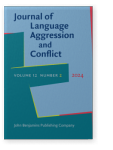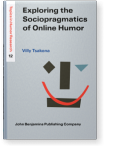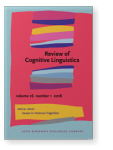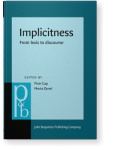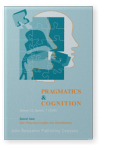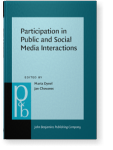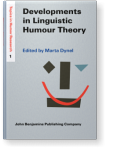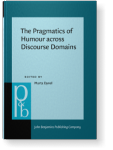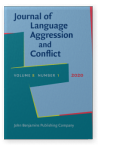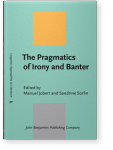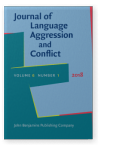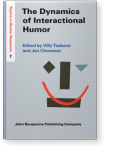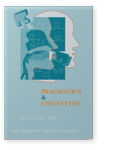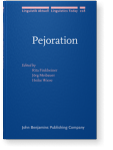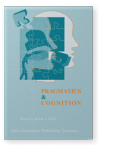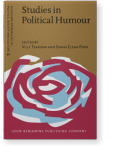Marta Dynel
List of John Benjamins publications for which Marta Dynel plays a role.
Journal
Book series
Issues in Humour Cognition
Edited by Marta Dynel
Special issue of Review of Cognitive Linguistics 16:1 (2018) vi, 315 pp.
Subjects Cognition and language | Cognitive linguistics
Implicitness: From lexis to discourse
Edited by Piotr Cap and Marta Dynel
[Pragmatics & Beyond New Series, 276] 2017. vi, 306 pp.
Subjects Discourse studies | Pragmatics
New Theoretical Insights into Untruthfulness
Edited by Marta Dynel
Special issue of Pragmatics & Cognition 23:1 (2016) v, 208 pp.
Subjects Cognition and language | Cognitive psychology | Discourse studies | Philosophy | Pragmatics
Participation in Public and Social Media Interactions
Edited by Marta Dynel and Jan Chovanec
[Pragmatics & Beyond New Series, 256] 2015. vi, 285 pp.
Subjects Discourse studies | Pragmatics
Developments in Linguistic Humour Theory
Edited by Marta Dynel
[Topics in Humor Research, 1] 2013. xiv, 425 pp.
Subjects Cognition and language | Humor studies | Pragmatics
The Pragmatics of Humour across Discourse Domains
Edited by Marta Dynel
[Pragmatics & Beyond New Series, 210] 2011. vi, 382 pp.
Subjects Discourse studies | Pragmatics
2020 Arcana imperii*: The power of humorous retorts to insults on Twitter Journal of Language Aggression and Conflict 8:1, pp. 57–87 | Article
This paper reports the findings of a study on the mechanics of insult-retort adjacency pairs in Twitter interactions. The analysis concerns primarily the humorous retorts made by the pornographic entrepreneur Stormy Daniels, who has been pelted with politically-loaded misogynist insults, many of… read more
2018 Chapter 3. Deconstructing the myth of positively evaluative irony The Pragmatics of Irony and Banter, Jobert, Manuel and Sandrine Sorlin (eds.), pp. 41–58 | Chapter
Adopting a neo-Gricean perspective on the figure of irony, this chapter criticallyexamines the species of irony that communicates positive evaluation inits implicated meaning. A critical overview of the existing scholarship onthis type of irony is performed, with the focus being on the rationale… read more
2018 Theoretically on Mock Politeness in English and Italian Journal of Language Aggression and Conflict 6:1, pp. 149–165 | Discussion
This essay offers insights into the problematic notions of irony, sarcasm and mock politeness, inspired by Charlotte Taylor’s recent monograph Mock Politeness in English and Italian. A Corpus-Assisted Metalanguage Analysis. Different understandings of the concept of mock politeness, as well as… read more
2018 Taking cognisance of cognitive linguistic research on humour Issues in Humour Cognition, Dynel, Marta (ed.), pp. 1–18 | Article
This article is meant to give a state-of-the-art picture of cognitive linguistic studies on humour. Cognitive linguistics has had an immense impact on the development of humour research and, importantly, humour theory over the past few decades. On the one hand, linguists, philosophers and… read more
2018 Chapter 9. No child’s play: A philosophical pragmatic view of overt pretense as a vehicle for conversational humor The Dynamics of Interactional Humor: Creating and negotiating humor in everyday encounters, Tsakona, Villy and Jan Chovanec (eds.), pp. 205–228 | Chapter
This chapter sheds some light on the different interpretations of the notion of pretense across disciplines. Attention is paid primarily to the pragmatic and philosophical literature where pretense is used with regard to two linguistic notions: irony and deception. These are here conceptualized as… read more
2017 Chapter 6. Implicitness via overt untruthfulness: Grice on Quality-based figures of speech Implicitness: From lexis to discourse, Cap, Piotr and Marta Dynel (eds.), pp. 121–146 | Chapter
Grice’s (1989a [1975], 1989b [1978]) conversational implicature is a salient manifestation of implicitness, whilst the four figures of speech contingent on flouting the first maxim of Quality constitute an important group of phenomena that promote conversational implicature. Implicitness is then… read more
2017 Chapter 1. Implicitness: Familiar terra incognita in pragmatics Implicitness: From lexis to discourse, Cap, Piotr and Marta Dynel (eds.), pp. 1–12 | Chapter
The aim of this chapter is to shed light on the concept behind the label “implicitness”, which is ubiquitous in the pragmatic scholarship but has rarely constituted the focus of attention per se. In the teeth of the intuitive use of the label, which seems synonymous with “indirectness” used in… read more
2016 Two layers of overt untruthfulness: When irony meets metaphor, hyperbole or meiosis Pragmatics & Cognition 23:2, pp. 259–283 | Article
This philosophical-pragmatic paper discusses several forms of irony which rest on other figures of speech contingent on overt untruthfulness, namely the figures arising as a result of flouting the first maxim of Quality. It is argued that an ironic implicature may be piggybacked on another… read more
2016 Pejoration via sarcastic irony and sarcasm Pejoration, Finkbeiner, Rita, Jörg Meibauer and Heike Wiese (eds.), pp. 219–240 | Article
This chapter addresses two notions which have received hardly any attention in the studies on pejoration: irony and sarcasm. The two concepts are teased out in the light of ample and heterogeneous research. The author argues in favour of differentiating between the two with reference to neo-Gricean… read more
2016 On untruthfulness, its adversaries and strange bedfellows New Theoretical Insights into Untruthfulness, Dynel, Marta (ed.), pp. 1–15 | Article
This introductory paper aims to demystify the concept of untruthfulness. Drawing on the scholarship on deception, the author reports on a distinction between the (objective) truth and (subjective) truthfulness, as well as their respective opposites: falsehood and untruthfulness. An attempt is made… read more
2016 Comparing and combining covert and overt untruthfulness: On lying, deception, irony and metaphor New Theoretical Insights into Untruthfulness, Dynel, Marta (ed.), pp. 174–208 | Article
This paper aims to differentiate between lying (seen as a type of deceiving) and irony, typically addressed independently by philosophers and linguists, as well as to discuss the cases when deception co-occurs with, and capitalises on, irony or metaphor. It is argued that the focal distinction can… read more
2015 Researching interactional forms and participant structures in public and social media Participation in Public and Social Media Interactions, Dynel, Marta and Jan Chovanec (eds.), pp. 1–23 | Article
2015 Impoliteness in the service of verisimilitude in film interaction Participation in Public and Social Media Interactions, Dynel, Marta and Jan Chovanec (eds.), pp. 157–182 | Article
This paper addresses the issue of impoliteness in the context of the verisimilitude
of film discourse. Taking as its departure point the notion of participation
framework encompassing two levels of communication underlying film
interaction and drawing on the recent developments in the relevant… read more
2013 When does irony tickle the hearer? Towards capturing the characteristics of humorous irony Developments in Linguistic Humour Theory, Dynel, Marta (ed.), pp. 289–320 | Article
Whilst not all irony (understood as a figure of speech) coincides with humour, the two phenomena do overlap. The paramount objective of this paper is to elucidate the central factors which render irony humorous, on the strength of incongruity and superiority theories of humour, as well as several… read more
2013 A view on humour theory Developments in Linguistic Humour Theory, Dynel, Marta (ed.), pp. vii–xiv | Article
2013 Impoliteness as disaffiliative humour in film talk Developments in Linguistic Humour Theory, Dynel, Marta (ed.), pp. 105–144 | Article
This chapter sheds light on the workings of impoliteness as a source of disaffiliative humour in fictional interactions in films, series and serials designed for their viewers (dubbed “recipients”). A number of postulates are proposed against the backdrop of humour theory, as well as the research… read more
2011 “I’ll be there for you!” On participation-based sitcom humour The Pragmatics of Humour across Discourse Domains, Dynel, Marta (ed.), pp. 311–334 | Article
The paramount objective of this article is to tease out the workings of participation-based humour in film discourse. The departure point is an extension of the dyadic model of communication in the context of fictional media discourse. Differentiation is thus made between hearer types at the… read more
2011 Pragmatics and linguistic research into humour The Pragmatics of Humour across Discourse Domains, Dynel, Marta (ed.), pp. 1–16 | Article
“Only a humorist could take humour apart, and he has too much humour to do it”(Robert Benchley)
read more2011 Turning speaker meaning on its head: Non-verbal communication and intended meanings Pragmatics & Cognition 19:3, pp. 422–447 | Article
This article addresses the issue of non-verbal communication in the light of the Gricean conceptualisation of intentionally conveyed meanings. The first goal is to testify that non-verbal cues can be interpreted as nonnatural meanings and speaker meanings, which partake in intentional communication. read more
2011 Chapter 5. Entertaining and enraging: The functions of verbal violence in broadcast political debates Studies in Political Humour: In between political critique and public entertainment, Tsakona, Villy and Diana Elena Popa (eds.), pp. 109–133 | Article
This article advances a theoretical proposal on the pragmatics of verbal violence, which promotes humour in televised political debates. Its underlying objective is to contest the well-entrenched assumption that the viewer should be conceptualised as an overhearer, in favour of a new theoretical… read more
2011 Joker in the pack: Towards determining the status of humorous framing in conversations The Pragmatics of Humour across Discourse Domains, Dynel, Marta (ed.), pp. 217–242 | Article
Researchers tend to use the concept of a play frame, a humorous frame or humorous keying in reference to a peculiar communicative mode within which humorous utterances and exchanges are enclosed. The goal of this chapter is to discuss this postulate, explaining the terms used in reference to the… read more
